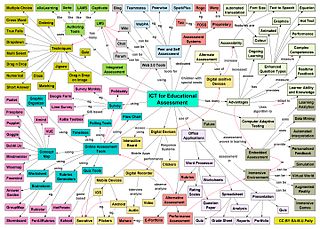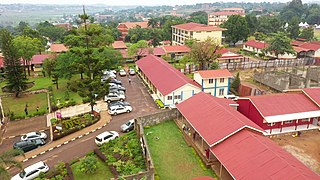
Becta, originally known as the British Educational Communications and Technology Agency, was a non-departmental public body funded by the Department for Education and its predecessor departments, in the United Kingdom. It was a charity and a company limited by guarantee. The abolition of Becta was announced in the May 2010 post-election spending review. Government funding was discontinued in March 2011. Becta went into liquidation in April 2011.

The Lifelong Learning Programme 2007–2013 was the European Union programme for education and training.

Information and communications technology (ICT) is an extensional term for information technology (IT) that stresses the role of unified communications and the integration of telecommunications and computers, as well as necessary enterprise software, middleware, storage and audiovisual, that enable users to access, store, transmit, understand and manipulate information.
Technology education is the study of technology, in which students "learn about the processes and knowledge related to technology". As a field of study, it covers the human's ability to shape and change the physical world to meet needs, by manipulating materials and tools with techniques. It addresses the disconnect between wide usage and the lack of knowledge about technical components of technologies used and how to fix them. This emergent discipline seeks to contribute to the learners' overall scientific and technological literacy, and technacy.

The New Partnership for Africa's Development E-School Program is included as a means to provide ICT equipment such as computers and internet access to all schools in member nations within The New Partnership for Africa's Development (NEPAD) program. NEPAD parents the E-School Program and is an economic program that aims to bring economic and social development to African nations and ensure 'Africa's Renewal'. The E-School Program began with Demonstration Projects and has developed further yet remains a work in progress in many countries, facing both criticism and support.

Nkumba University (NKU) is a chartered private university in Uganda. It was established in 1994 as part of a group of schools and colleges that originally grew from a kindergarten established in 1951. The university is not affiliated with any particular religious organization, but it accommodates several religious associations.
An open-source curriculum (OSC) is an online instructional resource that can be freely used, distributed and modified. OSC is based on the open-source practice of creating products or software that opens up access to source materials or codes. Applied to education, this process invites feedback and participation from developers, educators, government officials, students and parents and empowers them to exchange ideas, improve best practices and create world-class curricula. These "development" communities can form ad-hoc, within the same subject area or around a common student need, and allow for a variety of editing and workflow structures.
People First Network, also known as PFNet or Pipol Fastaem, started in Solomon Islands as part of UNDP's Solomon Islands Development Administration Planning programme (SIDAPP) and was developed by technical advisor David Leeming, Randall Biliki and others from January 2001. People First Network was initially a series of email stations around the Solomon Islands. The network provides email and other services to very remote rural areas. In particular the project was started as a means to link people to peacemakers following the ethnic tension and civil unrest in 2000, by providing rural communications and participatory news and information service.
A hospital school is a school operated in a hospital, generally a children's hospital which provides instruction to all primary and secondary grade levels. These schools help children regain academic progress during periods of hospitalization or rehabilitation. The schools are most often accredited and run by the local public school system, funded by the state, and are based on the same curriculum and testing mandated by the state as is practical for the students. Enrollments are low when compared to traditional schools and teachers must provide instruction for many grade levels.
European Schoolnet or EUN is a network of 34 European Ministries of Education, based in Brussels. As a not-for-profit organisation, it aims to bring innovation in teaching and learning to its key stakeholders: Ministries of Education, schools, teachers, researchers, and industry partners.
Openmind Projects (OMP), in Nong Khai Province, Thailand is a developmental aid organisation focused on helping communities in Thailand, Laos, Cambodia, and Nepal through the creation and management of grass roots projects in the areas of e-learning, education, and environment. The focus of the organisation is using information and communication technologies (ICT) to educate individuals in schools, orphanages, national parks, and villages. Projects rely on volunteers to promote changes in local communities.
Design for All in the context of information and communications technology (ICT) is the conscious and systematic effort to proactively apply principles, methods and tools to promote universal design in computer-related technologies, including Internet-based technologies, thus avoiding the need for a posteriori adaptations, or specialised design.
The Marchmont Observatory conducts academic research in support of local government policy formation concerning skills, employment and education for adults through networking, the development of learning programmes and research.

Institute for Information, Telecommunication and Media Law or ITM is a research & educational organisation located in Münster, North Rhine-Westphalia in Germany. All major research projects conducted by ITM are ordered by European Commission. Scientific Council of the Institute is presented by Prof. Dr.Dr. Gunnar Bender, Wilhelm Berneke, Jon Bing, Santiago Cavanillas, Herbert Fiedler, Heinz Lothar Grob, Fritjof Haft, Bernt Hugenholtz, Hans Jarass, Wolfgang Kilian, Miriam Meckel, Ernst-Joachim Mestmäcker, Ursula Nelles and other prominent scientists.
The European Distance and E-Learning Network, abbreviated EDEN and originally named the European Distance Education Network - established in 1991, is an international educational association open to institutions and individuals dealing with e-learning, open education, and distance education. EDEN is a not-for-profit organisation, registered as a limited company under English law.
The European Agency for Special Needs and Inclusive Education is an independent organisation that acts as a platform for collaboration for its 31 member countries, working towards ensuring more inclusive education systems. The Agency's mission is to help member countries improve the quality and effectiveness of their inclusive provision for all learners. This short animation video explains how the Agency works with its member countries.
The OER4Schools programme is a teacher professional development programme utilizing information and communication technologies (ICT), focussing on sub-Saharan Africa. It was initiated at the Centre for Commonwealth Education, based at the Faculty of Education, University of Cambridge. Aspects of the OER4Schools project are developed in conjunction with OER Africa.
Educational technology in sub-Saharan Africa refers to the promotion, development and use of information and communication technologies (ICT), m-learning, media, and other technological tools to improve aspects of education in sub-Saharan Africa. Since the 1960s, various information and communication technologies have aroused strong interest in sub-Saharan Africa as a way of increasing access to education, and enhancing its quality and fairness.

Kerala Infrastructure and Technology for Education (KITE) is a state owned special purpose company under education department of the Government of Kerala. It was developed to support ICT enabled education for schools in Kerala. The erstwhile IT@School Project was transformed into KITE for extending its scope of operations in August 2017. KITE was the first SPV company to get funded by KIIFB.
The UNESCO King Hamad Bin Isa Al-Khalifa Prize for the Use of Information and Communication Technologies (ICT) in Education is a UNESCO prize which rewards projects and programmes of individuals, institutions, other entities or non-governmental organizations for the creative use of information and communication technologies to enhance learning, teaching and overall education performance.
ICT for Home and Hospital Education – based on best practices of the LeHo (Learning at Home and in the Hospital) project [2]






